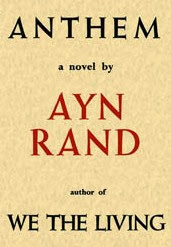Chapter 1:
It is a sin to write this. It is a sin to think words no others think and to put them down upon a paper no others are to see. It is base and evil. It is as if we were speaking alone to no ears but our own. And we know well that there is no transgression blacker than to do or think alone. We have broken the laws. The laws say that men may not write unless the Council of Vocations bid them so. May we be forgiven!
But this is not the only sin upon us. We have committed a greater crime, and for this crime there is no name. What punishment awaits us if it be discovered we know not, for no such crime has come in the memory of men and there are no laws to provide for it.
It is dark here. The flame of the candle stands still in the air. Nothing moves in this tunnel save our hand on the paper. We are alone here un-der the earth. It is a fearful word, alone. The laws say that none among men may be alone, ever and at any time, for this is the great transgres-sion and the root of all evil. But we have broken many laws. And now there is nothing here save our one body, and it is strange to see only two legs stretched on the ground, and on the wall before us the shadow of our one head.
The walls are cracked and water runs upon them in thin threads without sound, black and glistening as blood. We stole the candle from the larder of the Home of the Street Sweepers. We shall be sentenced to ten years in the Palace of Corrective Detention if it be discovered. But this matters not. It matters only that the light is precious and we should not waste it to write when we need it for that work which is our crime. Nothing matters save the work, our secret, our evil, our precious work. Still, we must also write, for—may the Council have mercy upon us!—we wish to speak for once to no ears but our own.
Continue Reading
It is a sin to write this. It is a sin to think words no others think and to put them down upon a paper no others are to see. It is base and evil. It is as if we were speaking alone to no ears but our own. And we know well that there is no transgression blacker than to do or think alone. We have broken the laws. The laws say that men may not write unless the Council of Vocations bid them so. May we be forgiven!
But this is not the only sin upon us. We have committed a greater crime, and for this crime there is no name. What punishment awaits us if it be discovered we know not, for no such crime has come in the memory of men and there are no laws to provide for it.
It is dark here. The flame of the candle stands still in the air. Nothing moves in this tunnel save our hand on the paper. We are alone here un-der the earth. It is a fearful word, alone. The laws say that none among men may be alone, ever and at any time, for this is the great transgres-sion and the root of all evil. But we have broken many laws. And now there is nothing here save our one body, and it is strange to see only two legs stretched on the ground, and on the wall before us the shadow of our one head.
The walls are cracked and water runs upon them in thin threads without sound, black and glistening as blood. We stole the candle from the larder of the Home of the Street Sweepers. We shall be sentenced to ten years in the Palace of Corrective Detention if it be discovered. But this matters not. It matters only that the light is precious and we should not waste it to write when we need it for that work which is our crime. Nothing matters save the work, our secret, our evil, our precious work. Still, we must also write, for—may the Council have mercy upon us!—we wish to speak for once to no ears but our own.
Continue Reading




















